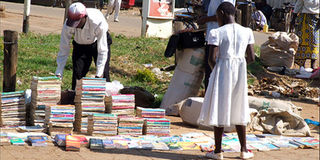Broke Kenyan schools vow to send pupils home

Secondhand book sellers in Kakamega had brisk business on Sunday as parents prepared for opening of schools on Monday. Buyers said new books were too expensive. Photo/ISAAC WALE
Schools in Kenya reopen on Monday but headmasters on Sunday said they will send students back home because they do not have money to run the institutions.
They want the government to release Sh10 billion under the free learning programme to keep schools open.
In the 1.4 million secondary schools, where the government is supposed to give Sh10,265 a year for every student, it has only released Sh4,964 this year.
This means that as the crucial exam term begins, the government owes schools ShSh5,301 for every child.
Prepare candidates
Kenya Secondary School Heads Association chairman Mr Cleophas Tirop said schools will be forced to send children back home since “we urgently need the money to prepare candidates for exams next month”.
“We are facing a major shortage of funds and cannot adequately prepare for the start of national examinations,” he said.
At the primary level, school managers say the free learning model is probably not working. The Kenya Primary Schools Heads Association chairman Joseph Karuga asked the government to look for alternative ways of funding the free education programme since “current arrangements appear to be failing”.
But the government has asked schools to be patient saying the money will be sent soon. Ms Magdalene Wambua, senior deputy secretary at the Education ministry, said teachers should “not to panic” since the ministry “is preparing to release the funds”.
“We have done the necessary (payment) schedules and are waiting for the Treasury to approve our request and send the money to us,” she said.
Money is sent
“Once the money is sent to us, it will not stay in our accounts for a day before it is released to schools.” She said free education was a priority for the government and teachers and parents had no reason to be “pessimistic”.
But amid the clamouring for cash, it was reported that the government has ordered 120 new cars for ministers and other top officials. With the drought, famine and an economy in poor health, Kenya is going through hard times. A large, wasteful government is not helping matters.
In schools, headmasters are forced to carry the weight of government policy gone wrong. This will be the first time in eight years that schools will not get new teachers after the government suspended recruitment.
Instead, it came up with the idea of employing interns whose recruitment was stopped by the courts after the Knut opposed it.
In total, the government owes the 1.4 million secondary school students about Sh5 billion this year less than three months to the end of the academic year.
Both the primary and secondary free learning programmes are expected to cost about Sh17 billion a year, Ms Wambua said, with the free-day secondary schooling taking the bigger chunk of the money.
“We are aware that schools are reopening and are prepared to release the funds as soon as we receive it from the Treasury,” she assured.
Education minister Sam Ongeri and permanent secretary Karega Mutahi spent most of last week at the East Africa School Games in Uganda and could not be reached for comment.
In primary schools, Mr Karuga said the government was yet to release the full Sh1,020 it was meant to give for every child in the last financial year.
“The problem in our hands is so big we cannot continue burying our heads in the sand,” he said. “We seem not to have a solid policy on how to fund the free learning programme making it difficult for us to run schools.”
He said the free education money approved in the supplementary budget early this year was yet to be sent to schools as promised.
As a result, schools have accumulated huge bills for water and electricity. Staff employed by schools have not also been paid their salaries for a long time. Most of the money sent to schools early this year was spent on drama and games, he said.




